Table of Contents
QUICK SUMMARY:
Agency burnout involves extreme physical and mental overwhelm due to work stress, significantly impacting employee productivity and agency success. This blog article shares effective strategies to identify and prevent marketing burnout, ensuring a balanced work-life scenario and promoting a supportive workplace environment. These insights from marketing agency leaders aim to guide others in sustaining their team's well-being and the agency's operational efficiency.
As a marketing agency owner or leader, you know that your greatest assets aren’t your technologies, your patented processes, or your client roster. It’s your people. People keep the lights on at your agency. They make the sales, do the work, troubleshoot the problems, wrangle the clients, and brainstorm new tactics to help marketing agencies grow.
One (of the many) responsibilities on your shoulders for growing your marketing agency is to help your team manage agency life and avoid burnout, which plays a crucial role in successful recruitment marketing. (Oh, and we think you should make it a priority to avoid burnout for yourself too!) Here’s how you do it.
In this article, we’ll cover how to identify agency burnout, figure out what’s causing it, and discuss proactive steps to prevent and resolve it.
Hustle culture doesn't deliver anything except disengagement and burnout. When people feel valued and cared for, they naturally deliver their very best work. This culture can also help your agency grow, attracting top talent by showing people what you do to support your staff and that you truly respect their needs.
– Michelle van Blerck, Digital Freak
What Are the General Signs of Burnout?
Let’s get one thing straight: agency burnout is real. It isn’t laziness or “being a snowflake.” It isn’t an unwillingness to work or a made-up term marketers throw around. Burnout is a real occurrence with truly negative consequences for the person or people affected and for your agency.
If you “don’t believe in burnout", you’ll never see it coming. But even if you do, agency burnout can be tricky to spot. It presents differently based on the person and the circumstances.
Job burnout is extreme physical and mental overwhelm and exhaustion due to stress. It can present in a variety of physical, mental, and emotional ways. Obviously, you can’t always have visibility or control of all of these symptoms for your employees (such changes in sleep patterns and challenging personal circumstances).
However, workplace symptoms of burnout can include:
Poor performance at work; which may present as inattention to detail
Drop in professionalism; poor attendance, being late for meetings
Rude remarks; being curt or hurtful
Avoidance; procrastination
Poor work-life balance
Harsh, unwarranted criticism
Passive aggressive behaviors
Complaints of physical exhaustion or feeling overwhelmed
A high rate of employee turnover
An increase in sick days
If you get wind that a member of your staff is showing these symptoms (or if you notice these symptoms in yourself), it’s time to have an honest look at whether or not it could be agency burnout.
Look for changes in attitude and outlook that may be expressed with uncharacteristic negativity or harshness; look for new conflicts with teammates, leadership, or clients; and look for increasing isolation.
10 Reasons Your Marketing Agency Staff May Feel Burnt Out
Causes of agency burnout can be subjective–what leads to burnout for one person might not for another. And what might have been water off a duck's back 2 years ago for a team member could lead to burnout today. But in general, we know that agency burnout is caused by high-intensity stress over prolonged periods of time.
The agency world is a unique realm–and don’t get us wrong, we love it!–but the particular demands of working in this field can lead to burnout. Whether due to a lack of management, dealing with crazy client requests, a faulty org structure, or a lack of resources, these are some of the most common reasons for burnout:
1. Heavy Workloads in a High-pressure Environment
Expectations in a marketing agency are high. As things have changed over the decades–particularly with the continued reshaping of the digital age–the bar for employees at advertising and marketing agencies has been raised exponentially.
Marketers are expected to produce high volumes of high-quality, highly sophisticated work. We bet that practically every member of your team is a skilled multi-tasker, likely with a broad range of competencies. It’s inherently stressful to be expected to be multidimensional and exceptional.
Workload problems account for a range of issues, from volume to the type of work. It generally stems from employees having far more work than they can reasonably accomplish on time and the constant feeling of being “behind” or “late”. It could also include the emotions brought on by a high volume of tasks they find monotonous or stressful. It may even spill over into an employee's personal life, affecting their mood after work hours.
Time is everything for a small & growing agency. Spending lots of time on one task is not only has financial effects but can also burn out the agency owner mentally. This in turn can lead to poor decision-making, which impacts the business further. Allowing for processes to be simple & effective allows for easier onboarding of staff members alongside a less stressful environment.
–Guy Hudson, Founder, Bespoke Marketing Plans
2. A Perceived Lack of Autonomy and Control
People tend to experience growing stress if they continually feel controlled or micromanaged. This can lead to insecurity and decision paralysis, like feeling they can’t so much as sharpen a pencil without asking permission. Other burned out employees might feel frustrated that, despite all their experience and education, they aren’t trusted to do their jobs.
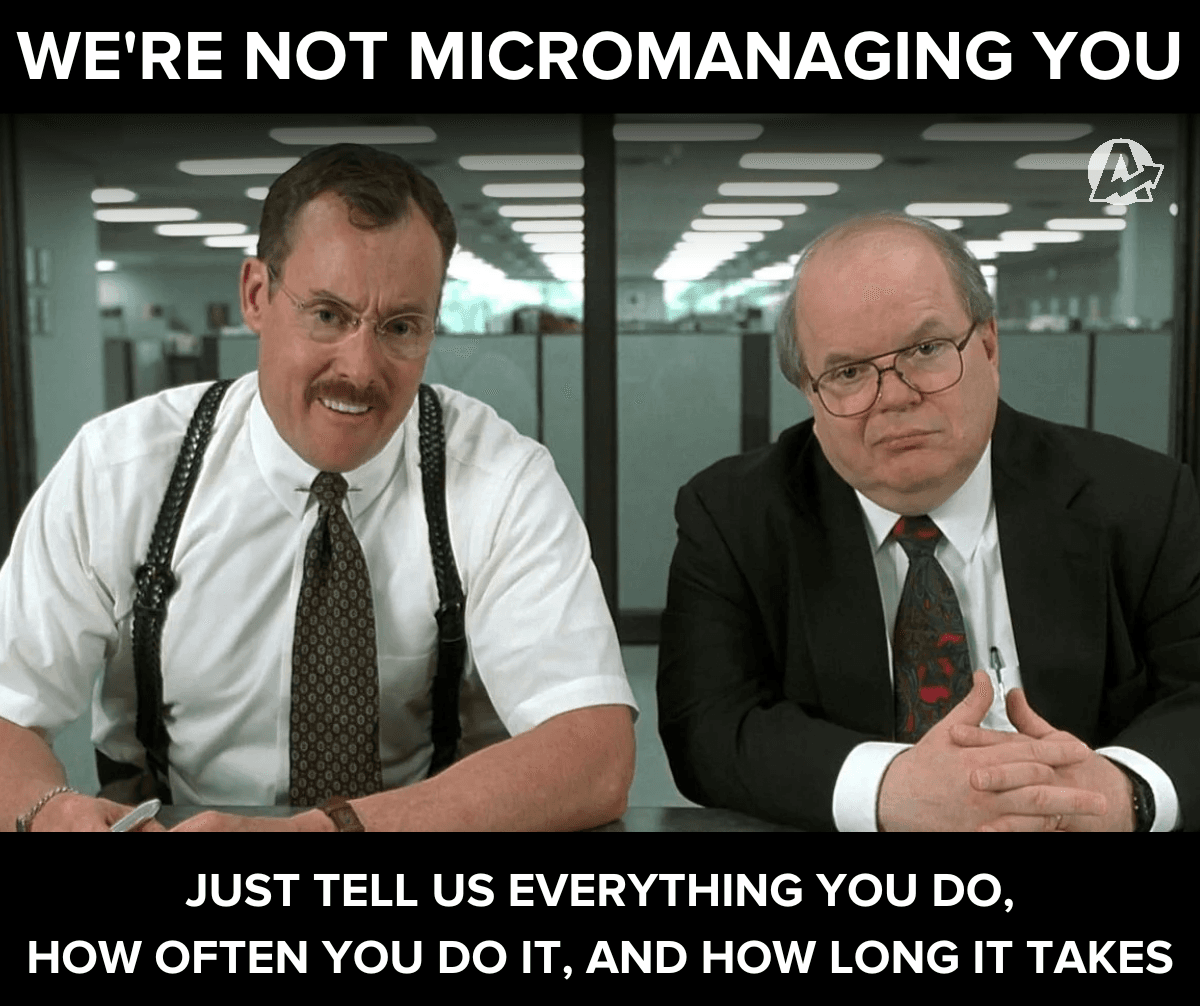
Talented employees are typically hired for their skills, knowledge, and experience. Because of this, they often work best when they have the autonomy to use their skills and expertise to complete their work.
Although it may be with the best of intentions, micromanaging these otherwise high-performers can undermine their ability to work efficiently, reduce their motivation, decrease productivity, and lead to employee burnout.
3. They’re Locked in a Fierce Competition
There’s no shortage of advertising and marketing agencies. (In fact, it’s in the top 20 of the most popular degrees one can earn in the United States.) Likewise, there’s no shortage of marketing content to compete against. For example, the average business creates 1.7 feed posts for Instagram per day, and we upload some 3.7 million videos to YouTube every day.
That’s a lot of content. Whether it’s competing for new business, a job or promotion, or engagement in a crowded digital space, the going is tough.
All that competition means it’s harder than ever to be relevant. Staying on top of trends and emerging technologies (hello, AI tools) while also being creative and unique requires an intense familiarity with the up-to-the-second activity in your space.
While marketers can automate some of this social monitoring, there’s still an intense amount of work to be done studying and analyzing existing and new content in order to beat out the competition and deliver high-performing campaigns. The toughest part is this element of the job never goes away.
4. Never Crossing the Finish Line
It’s a hazard of working in a marketing agency: the client’s gonna do what the client’s gonna do. From scope creep to “shiny object syndrome” and a high sense of urgency, marketers can often get burnt out by ambiguous, ever-changing priorities and the never-ending sense that this work is due now, but it’s also never done.
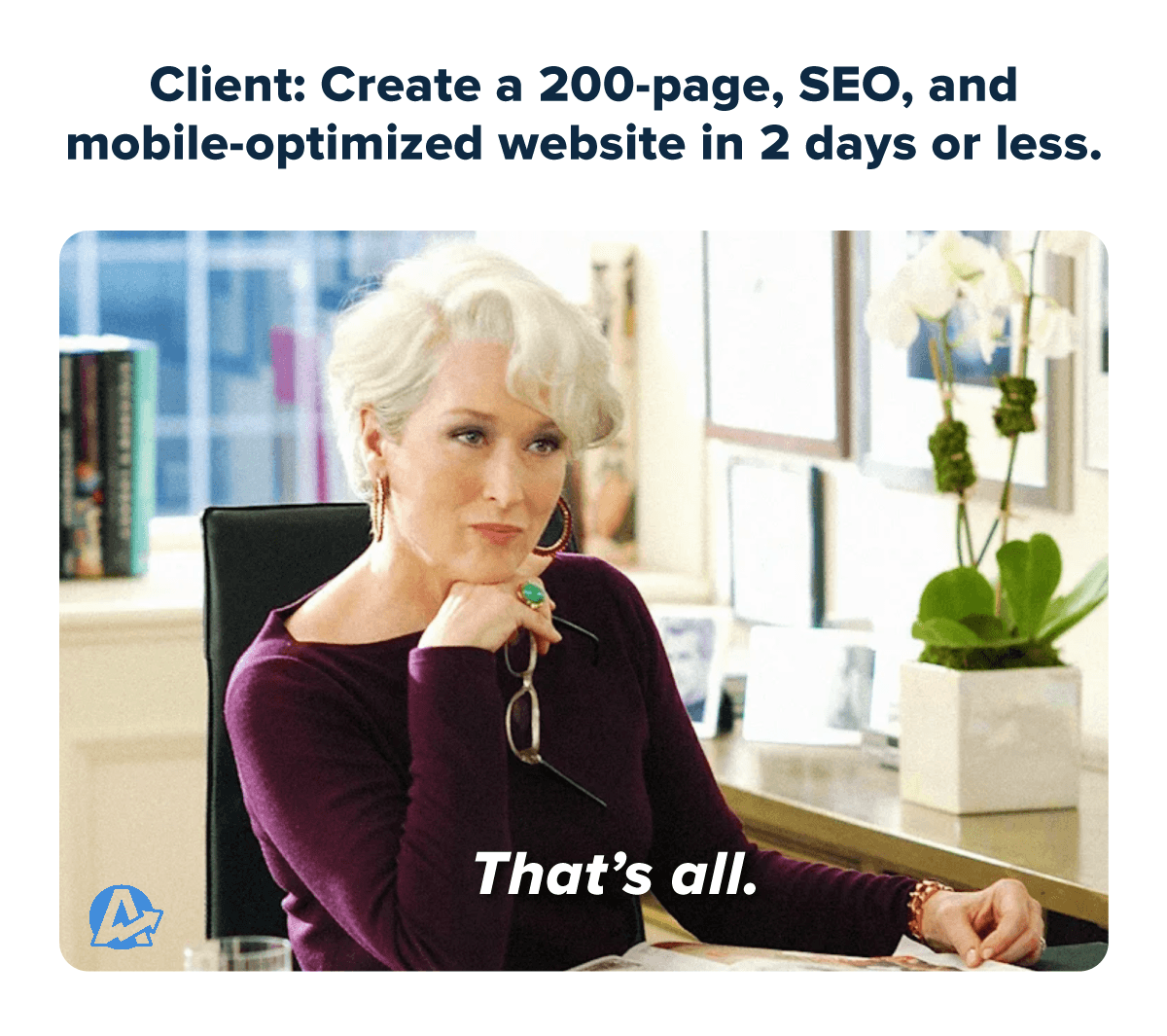
It’s bad for morale and highly stressful to feel like you aren’t making headway because the finish line is constantly moving further away. Most marketers learn to handle this to some degree; it’s a fairly common occurrence to have projects, priorities, or deadlines change in this line of work.
But an agency that allows employees to be buffeted around by clients’ whims will see burnout over time.
5. Struggling to Monitor and Understand Metrics and KPIs
Monitoring marketing metrics and KPIs is a key aspect of marketing; however, many people in this profession are not confident in their skills. Without time and expertise to excel at analytics, it can be a struggle for marketers to measure their success or prove their worth to their clients.
This lack of objective clarity creates stress for employees at marketing and ad agencies as they try to hone their strategies, justify their choices, retain clients, and even just feel a sense of accomplishment.
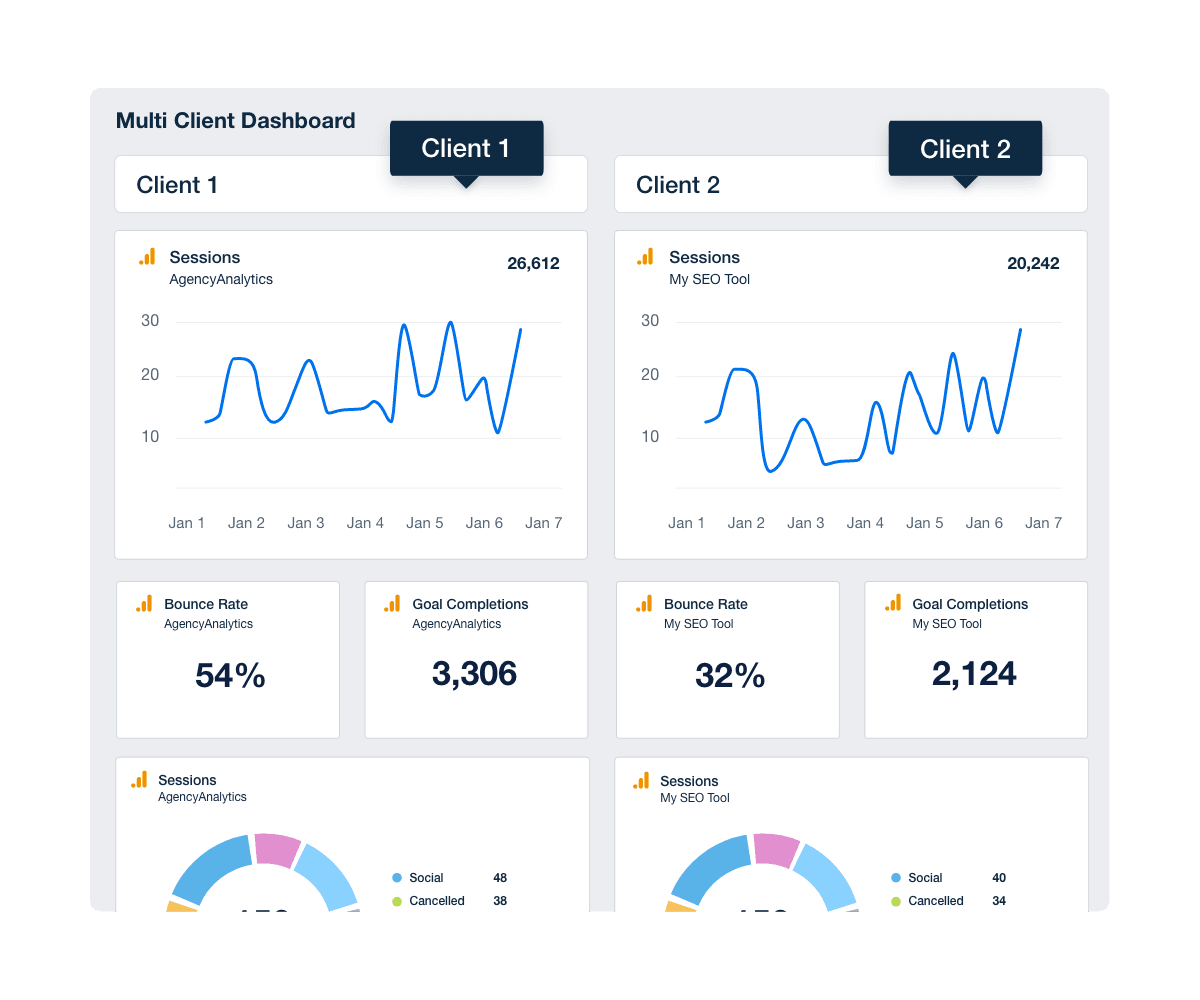
Give team members and clear and concise way to access the data they need to do their jobs. Try AgencyAnalytics free for 14-days.
6. They Don’t Have Sufficient Resources and Support
You can’t use positive thinking to breathe underwater. Likewise, no amount of grit or “can-do spirit” that your employees exhibit can compensate for a scarcity of needed resources.
What those resources are will depend drastically on the context. It could be trying to run a campaign on a shoestring budget or create technical content without enough input from a subject matter expert.

It could also be assigned tasks that fall way outside of their skillset without a teacher or mentor to guide them. Resources and support account for a broad range of factors, from financial, procedural, and material to mentorship, personnel, and workplace policies.
7. Ambiguity About Roles and Responsibilities
When one job bleeds into another, and there’s no clear division of tasks, your top account managers will drive themselves crazy trying to juggle all the balls–because they can’t trust that someone else won’t let them fall.
This contributes to impossibly high workloads because when you’re unable to delegate, you end up doing others’ work and constantly worrying that you’ve missed or forgotten something.
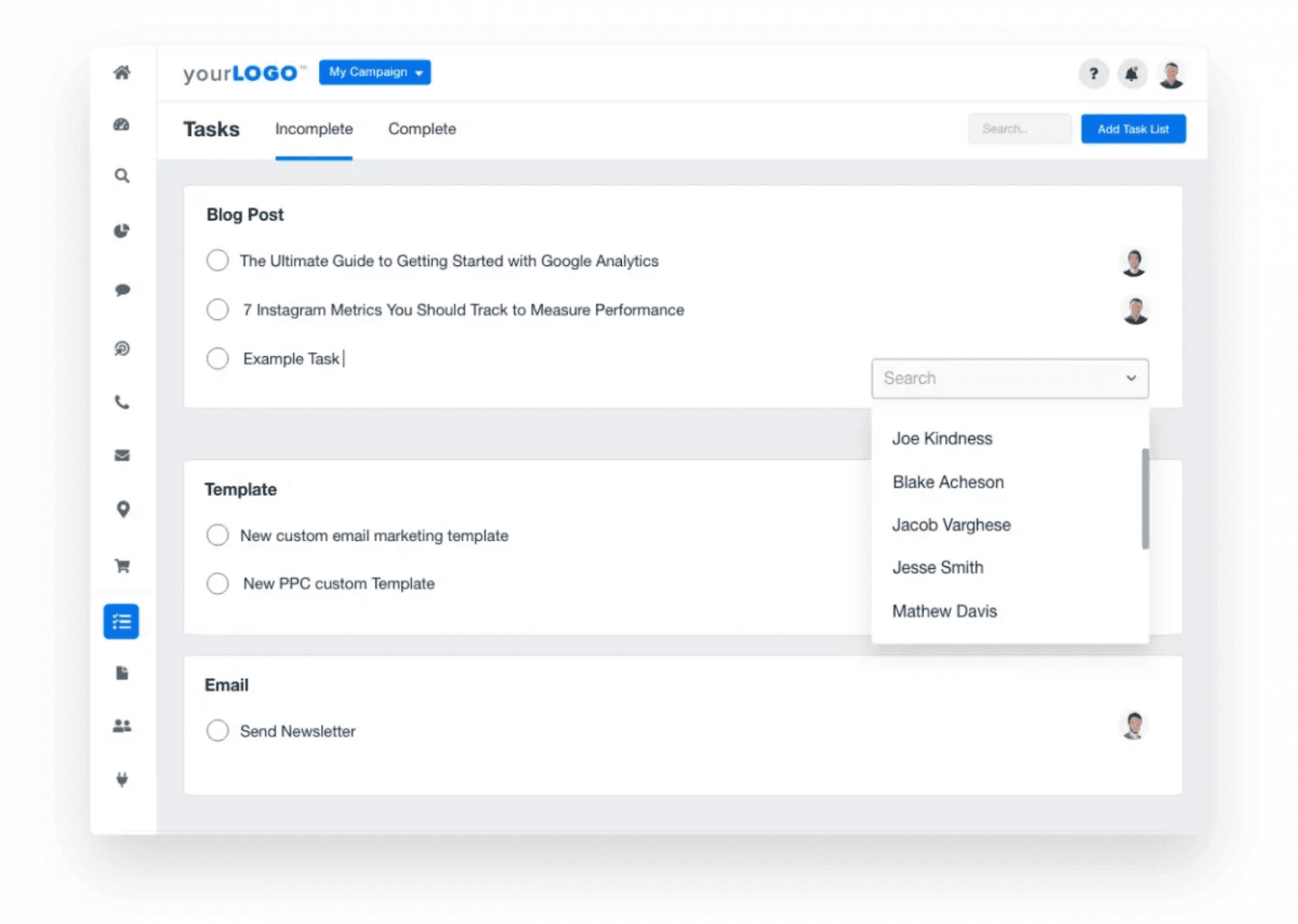
Clear task management process can help keep the entire team aligned on who is doing what. Start your AgencyAnalytics free trial today.
8. Harassment or a Toxic Agency Culture
No amount of free coffee or snacks can erase the damage of a toxic organizational culture. Harassment and toxic workplace culture can include: yelling/screaming, overly harsh criticism, scapegoating, bullying, unwanted sexual advances, microaggressions, subtle or overt racism, or discrimination.
These issues are an attack on a person’s psyche and identity and can cause acute workplace stress and anxiety. A person could appear to be excelling in their dream job and still experience employee burnout if their workplace implicitly condones this culture or if there isn’t support in place to protect victims.
It’s not often talked about, but remote work can also lead to problems with an agency’s culture. Issues that can arise from remote work include isolation, technology hurdles (like not having the right remote work tools), and disjointed communication. Remote teams can also have issues regarding workload balancing (e.g., some employees spending a bit too much time catching up on Love Is Blind while others are working at all hours of the night and day because their office is their bedroom and their bedroom is their office.
9. They Are Made To Feel Guilty for Wanting Work-life Balance
One of the best ways to prevent employee burnout is to regularly (e.g., daily) take time away to recharge. A lack of work-life balance means that your employees can’t recharge because they aren’t stepping away from work enough. Working–and thinking about working–24/7 is unhealthy and means that your mind and body are in constant heightened states of stress without sufficient periods of rest and relaxation.
In a world where employee burnout is becoming more common, and people wear 60-hour weeks on their sleeves like a medal of honor, to attract top talent you need to offer something different. We're seeing Gen Z employees prioritize self-care and work-life balance as we recruit.
–Steve Andrews, She Reigns Creative
Like a continuously running motor that eventually overheats, your mind and body need time to “cool off” to function optimally. (More on how to achieve a healthy work-life balance below.)
10. Linking Performance to Self-worth
It’s possible that some people are more prone to burnout than others due to innate personality traits or experiences in their lives. If some individuals identify strongly with perfectionism or base their identities strongly on their work performance, their mental health may suffer when work is particularly stressful or when they perceive that they have “failed” or misstepped.
Let’s say a client calls, and they’re enraged because the brand campaign you launched last week has some imagery they find off-brand.
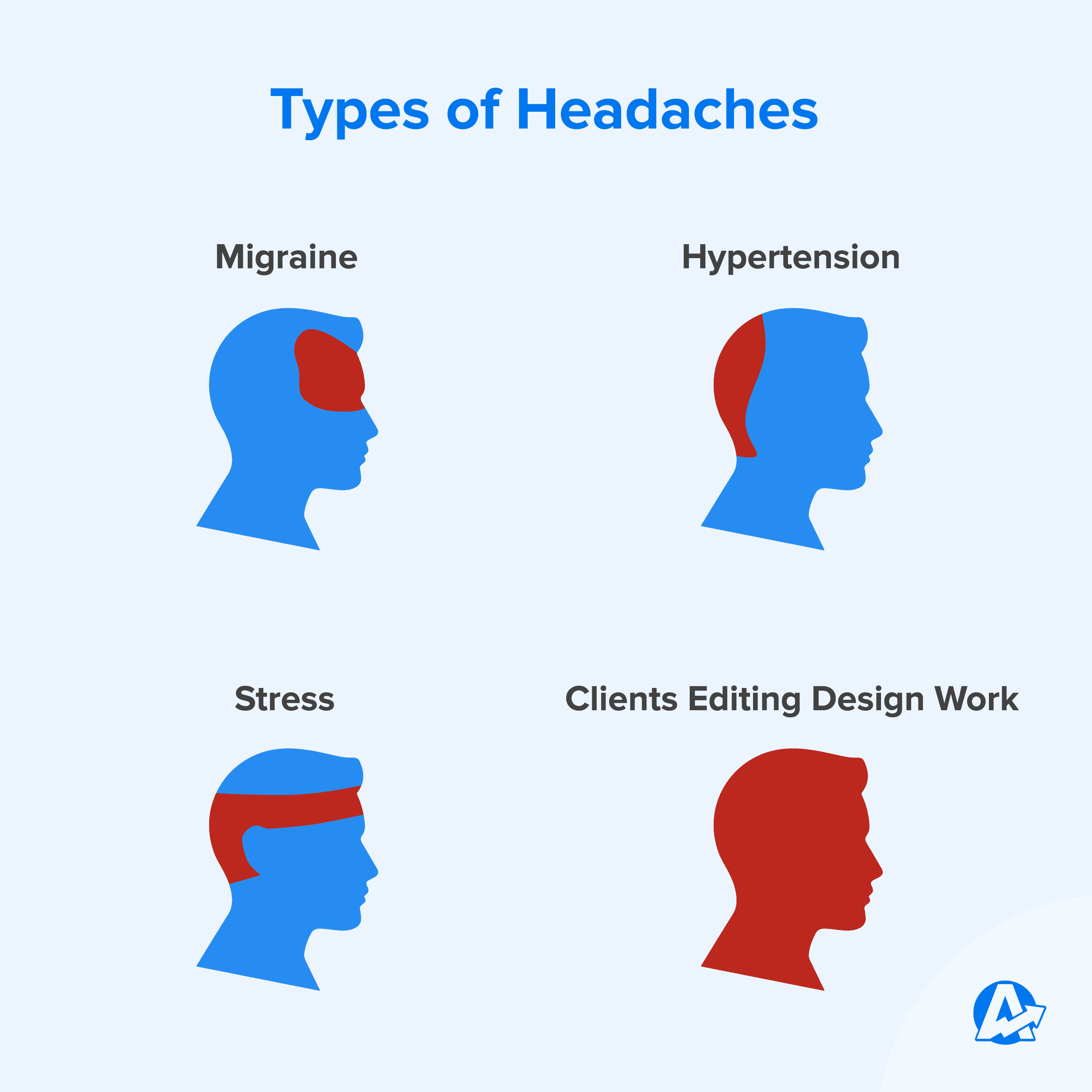
While one person may swiftly and decisively handle the problem and move on, another may spiral about this mistake, perceiving it as evidence that they are worthless, stupid, or unworthy of their job.
These peaks and valleys of high stress and low self-esteem create the perfect breeding ground for burnout to fester.
7 Tips for Preventing Employee Burnout at Marketing Agencies
Thankfully, there are several proactive ways for preventing employee burnout in the marketing and advertising industry. Let's explore further.
1. Acknowledge the Reality of Employee Burnout in Honest Conversations
Probably one of the most important things an agency owner or executive can do is acknowledge that burnout does happen. If the topic of burnout is a bogeyman that no one feels they can discuss, you’ll end up in one of several toxic situations: agency staff griping behind closed doors, employees suffering alone and then suddenly taking sick leave or a painful exodus as people head for greener pastures.
So, take the lead and talk with your employees at all levels about burnout (and make sure that your senior and mid-level managers feel empowered to have these conversations too). Let them know that the leaders at this agency acknowledge the existence of burnout and–this is the crucial part–that you care that it doesn’t happen to anyone.
Let’s just pause here to say: we get it. We get that you have an incredible amount of workplace stress and responsibility on your shoulders. We get that sometimes it feels like the only thing you really need to care about is how to improve productivity. And profit margin. And pipeline. And so on. Can people just stop whining and get the job done?
But, if you’re having trouble exercising your empathy muscles… you may also be on the cusp of burnout.
2. Prioritize and Celebrate Self-care for Employees
Self-care refers to the activities one chooses to promote their physical, mental and emotional wellness. If that sounds a little broad to you, it’s because self-care means something different to everyone.
Unfortunately, self-care is a term that’s been hijacked by the wellness industry to sell scented candles and bath bombs. Let’s be clear: no amount of lavender bubble bath can solve the problem of doing the jobs of three people or being belittled by a narcissistic client.
But real self-care, done continuously with intention and tailored to the individual, can be a fantastic mitigator against burnout.
Our ethos is “work hard, play hard.” We take a relaxed approach to agency life, with lots of time to take a break, play a game of Mario Kart or even work from home if need be. Most of us have worked stressful corporate jobs before, so having time to unwind means we can approach our work with a clear, focused head and continue to provide the amazing results that we do for our clients.
–Claire Aldridge, Victory Digital
Note that we said “activities” plural. It’s not one hike or one yoga class. It’s not the occasional manicure or a once-in-a-blue-moon meet-up with friends. Self-care needs to be purposeful, multidimensional, and ongoing.
Here are some examples of self-care wins that you may be able to foster at your agency:
Lunchtime walks in your area
Optional team bonding activities
Registering as a team for a recreational sports league
Reminding staff they have a right to disconnect or implementing “quiet hours” on evenings and weekends
Flexible working hours
Giving kudos or recognition (when merited) publicly and regularly (e.g., at your quarterly town hall meetings.)
Wellness programs or incentives
Team volunteering programs or charitable fundraisers
Benefits plans that include therapy/psychology
Hiring enough staff so that workloads are balanced and reasonable
Healthy snacks offered in a communal space
Flex days in addition to traditional “sick days” that staff can use for their mental health
Agency Tip: The most important thing you can do to prevent burnout at your agency is to encourage leadership to show interest in–and respect for–the work-life balance of employees. If your agency has a culture of rewarding those who sit at their desks the longest or who are firing off emails from the early morning hours of their vacation or who are logging on every weekend to “stay on top of things”, you’re feeding the fires of burnout.
3. Prioritize and Celebrate Self-care for Yourself
Another important way to encourage your employees to prioritize self-care is to lead by example. Your team needs to see that you have a strong work-life balance and commitment to self-care. Let them see you step outside at lunchtime or talk about your latest frisbee golf victory.
You’ll boost their confidence even further when you mention that you are intentionally performing self-care tasks as a way of safeguarding your own well-being against burnout. Remember, it all starts with agency leadership.
4. Foster Effective Time Management Skills
For some, it’s not that they are so overworked and overloaded that it’s impossible to get it all done. It might be that they mismanage their time. We live in an era of near-constant distraction–and as marketers, we are especially pulled in multiple directions. Everyone, from the new graduate to the seasoned pro, can benefit from honing and improving their time management skills.
We won’t go into detail in this article about time management tips (you’re here to learn about burnout, so that wouldn’t be a good use of your time), but we will extoll the benefits of time management just a little longer.
Effective time management will help your team:
Get more done
Prioritize and get the most important things done first
Ensure that team members are spending the right amount of time on activities based on their urgency, importance, and value
Delegate tasks strategically
Seek out ways to streamline or automate time-consuming tasks
Reduce your stress and help avoid burnout
(Psst! Check out this article for more tips on running and scaling your digital agency.)
5. Hire, Retain, and Fire Accordingly
If we had to guess, we’d bet that when you started your started agency, you had a vision of how you would run things. Maybe you thought they’d be different from the place where you got your start. Maybe you wanted to mirror the culture of organizations you admired. You probably didn’t picture yourself cracking a whip and cackling maniacally as you worked your staff into the ground. Whatever motivated you at the beginning, it’s still within your power today–but you’ll have to tow a hard line.
Culture at a marketing agency is set from the top down and fostered by the people who work there. The worst elements of your company culture will be based on the worst behaviors you and your leaders exhibit and tolerate. You’ll need to figure out with your managers how to strike a balance at your agency of pushing your team to achieve great results without driving them to burnout.
Agency Tip: The culture nurtured by yourself and your managers will hold the most influence as to whether your top talent stays or goes–so it will directly affect the cost of staff turnover at your agency. And there are special considerations if you are building a remote agency.
Another big element of finding this balance is how you staff your agency. Aside from all the hard skills you’re looking for, you’re also looking for driven, motivated individuals who are level-headed, empathetic, and reasonable. These qualities will help your managers connect with employees and lead them fairly and effectively.
These same qualities will help your frontline employees manage their own mental health and well-being. You don’t want the perfectionist workaholic who brags about never taking a vacation. That person will burn out at the worst possible moment and leave your team high and dry. You’re looking for a marketer who knows they produce more work, and better quality work, when they aren’t burnt out and who confidently and unapologetically protects their work-life balance.
Read more on How to Avoid Mistakes When Your Agency is Scaling Fast.
6. Set Boundaries and Communicate Expectations
As you saw in the sections above, confusion, assumptions, and ambiguity lead to stress and overwork. So get comfortable having uncomfortable conversations to ensure boundary setting–with yourself, your colleagues, and your clients.
This could mean asking your staff to save their questions and concerns for your bi-weekly “open office hours” rather than pinging you on Teams at all hours. It could mean implementing rules as to how employees prepare in advance for their vacations so that their replacement is set up for success and not calling them in a panic while they’re ziplining in Costa Rica. It could also be adapting your SOWs and managing client expectations to protect your team against extra (unpaid) work.
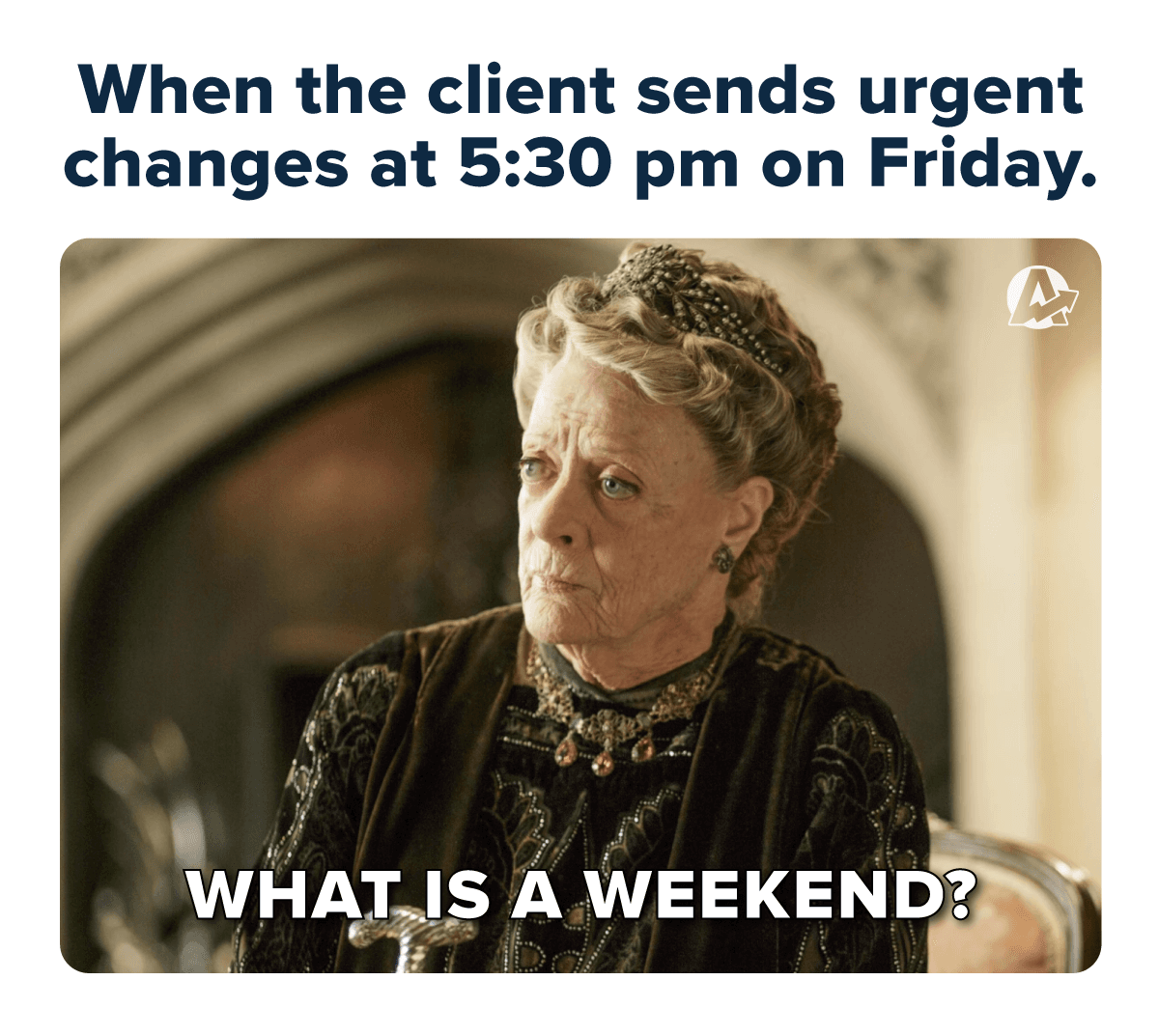
Saying “no” and asking clearly and honestly for what we need makes us feel vulnerable; it’s human nature. But it’s also the only way to limit the stress we experience and enforce boundary setting.
Agency Tip: Boundaries can change! Don’t be afraid to communicate a boundary and change it later if you find it’s not working for you. For instance, you may tell your staff you don’t want to be CC’ed on certain things and later find out that it’s harder for you to jump in during a crisis when you’ve been left off the email chain. Simply set a new boundary.
7. Practice Mindfulness and Stress-reduction Techniques
As leaders at marketing and ad agencies, you can’t always control the stressful situations you or your team face. From tight deadlines to unreasonable client expectations, a tough economy, or a weak sales quarter, some things are just inherently stressful, and there’s no point in trying to deny or avoid that fact.
So instead of trying to change the context in which you live and work, we recommend working to change your mindset, which in turn has physical benefits. This will take time and practice, but you can leverage the well-known tools and exercises of psychologists and philosophers to improve how you manage stress in your personal and agency life.
Mindfulness and other stress reduction techniques, such as stoicism and meditation, can help you face stressful situations without suffering from a breakdown or burnout.
And the less stress you are under, as the agency leader, the less stress that will trickle down to your team members.
Only You Can Prevent Job Burnout at Your Marketing Agency

You can’t pour from an empty cup. If you think that’s a tired old trope, think again. We would call it the golden rule of personal and professional success. So take your cue from Smokey the Bear and accept responsibility for preventing employee burnout and even identify the signs in yourself.
You and your team will all be more productive, efficient, and effective when you have a healthy work-life balance. It's all about taking a proactive approach to prevent employee burnout and stop it before it happens.

Written by
Elyse Gagné develops branding and content strategies that unite businesses with their customers. A podcast junkie, you'll find her learning about the latest technologies and brand storytelling techniques while she gardens or hikes.
Read more posts by Elyse GagnéSee how 7,000+ marketing agencies help clients win
Free 14-day trial. No credit card required.






